 Petzlover
Petzlover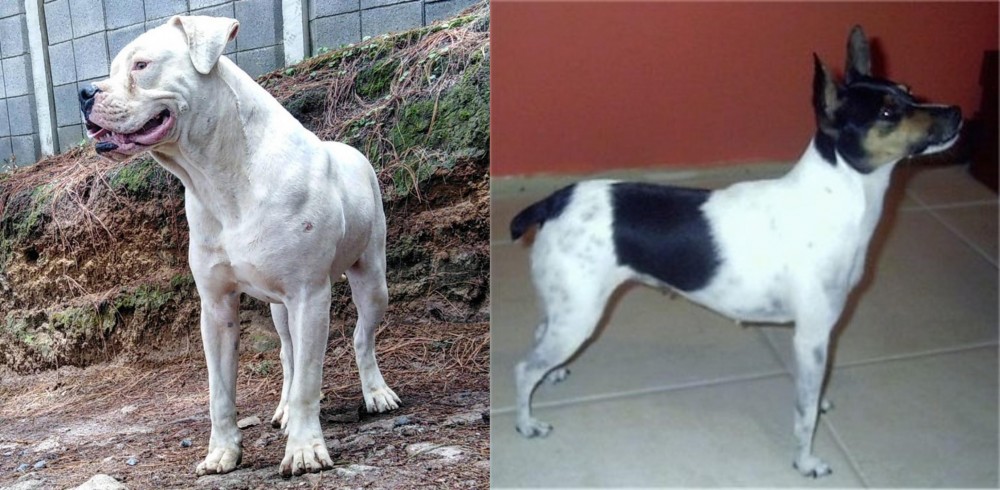 Dogo Guatemalteco is originated from Guatemala but Miniature Fox Terrier is originated from Australia. Dogo Guatemalteco may grow 30 cm / 12 inches higher than Miniature Fox Terrier. Dogo Guatemalteco may weigh 39 kg / 86 pounds more than Miniature Fox Terrier. Both Dogo Guatemalteco and Miniature Fox Terrier has almost same life span. Dogo Guatemalteco may have more litter size than Miniature Fox Terrier. Dogo Guatemalteco requires Moderate Maintenance. But Miniature Fox Terrier requires Low Maintenance
Dogo Guatemalteco is originated from Guatemala but Miniature Fox Terrier is originated from Australia. Dogo Guatemalteco may grow 30 cm / 12 inches higher than Miniature Fox Terrier. Dogo Guatemalteco may weigh 39 kg / 86 pounds more than Miniature Fox Terrier. Both Dogo Guatemalteco and Miniature Fox Terrier has almost same life span. Dogo Guatemalteco may have more litter size than Miniature Fox Terrier. Dogo Guatemalteco requires Moderate Maintenance. But Miniature Fox Terrier requires Low Maintenance
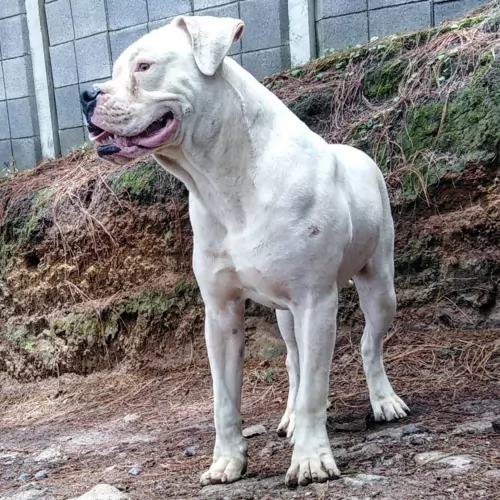 Known as the Guatemalteco Bull Terrier or Guatemalan Molosser, the Dogo Guatemalteco is also known as the Bull Terrier Guatemalteco, Guatemalan Bull Terrier, and Guatemalan Molosser.
Known as the Guatemalteco Bull Terrier or Guatemalan Molosser, the Dogo Guatemalteco is also known as the Bull Terrier Guatemalteco, Guatemalan Bull Terrier, and Guatemalan Molosser.
This big Molosser-type dog originates in Guatemala. In the 20th century, it was known as the Bullterrier Guatemalteco, but at the end of the century, it was changed to Dogo Guatemalteco.
Today, while the dog is kept as a companion dog, most are working guard dogs. The Dogo Guatemalteco isn’t recognized by any major international kennel clubs. However, the Kennel Club of Guatemala has given full recognition to this dog and it was in 1981 that the Guatemalan government named the dog as their national dog breed.
 Known as Mini Foxies or Toy Fox Terriers, these dogs hail from Australia, having been bred there since the 1800s already.
Known as Mini Foxies or Toy Fox Terriers, these dogs hail from Australia, having been bred there since the 1800s already.
They are descendants of fox terrier types which were bred in England and then brought to Australia by early settlers.
It is believed the small Smooth Fox Terriers were crossed with Manchester Terriers and then the puppies further bred and crossed with other small breeds. The idea was to have a small, light, quick dog. The Miniature Fox Terrier is exactly like this, developed as a hunting dog.
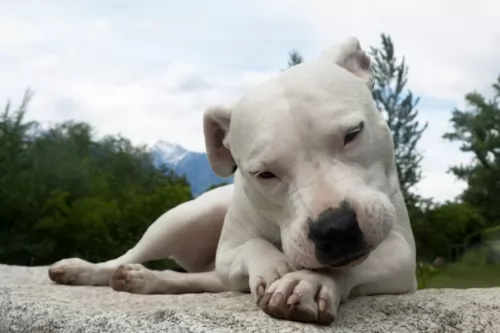 The Guatemalteco is a medium to large dog standing at 54 – 60cm and weighing between 40-45kg. He has a short, smooth coat and is essentially white with some black markings on the head.
The Guatemalteco is a medium to large dog standing at 54 – 60cm and weighing between 40-45kg. He has a short, smooth coat and is essentially white with some black markings on the head.
This breed was created from a crossing between a bull terrier, boxer and dalmatian. Some of the dogs are thickly built, while others are more leaner and athletic looking.
The ears of the dog vary quite a bit because while sometimes the ears fold down closely to the head, others are semi-pricked. There are some dog owners who have their dogs ears cropped into fully erect triangular shapes. The eye are small and usually dark brown.
The Dogo Guatemalteco is a fearless, evenly tempered dog. He was bred as a guard dog and he wants to protect his human family, forming a deep bond with them. It makes them difficult to re-home because of this.
It is imperative to have this dog trained and socialized because it might believe its the leader of the pack in your home. He is quite capable of getting along well with children and pets in the home. Because of his dominant nature, he isn’t suited as a pet for the first-time dog owner. He also doesn’t warm easily to strangers.
 With longevity on his side, the Miniature Fox Terrier can live to be between 10 and 14 years of age or live to be even older - up to 18 years of age.
With longevity on his side, the Miniature Fox Terrier can live to be between 10 and 14 years of age or live to be even older - up to 18 years of age.
He stands at between 24 – 30cm and weighs anything between 3 and 6kg. His coat is short but he sheds quite a bit so regular brushing will become necessary.
The coat is smooth and is mostly white and tan or white and black but it can be tri-colored too – white, black and tan.
The ears are semi-erect, semi floppy and he has a bright, expectant look about him. The tail has always been traditionally docked, giving him a distinctive look, but now it tends to be undocked.
Your Miniature Fox Terrier is a bold little dog, and is protective and loyal towards his human family. He is lively and courageous and has lots of energy so he will be wanting lots of games indoors and out. He will love to go on a walk every day.
They make great family pets, getting on well with children and other pets in the home. They’re adaptable and can do well in the city or the countryside.
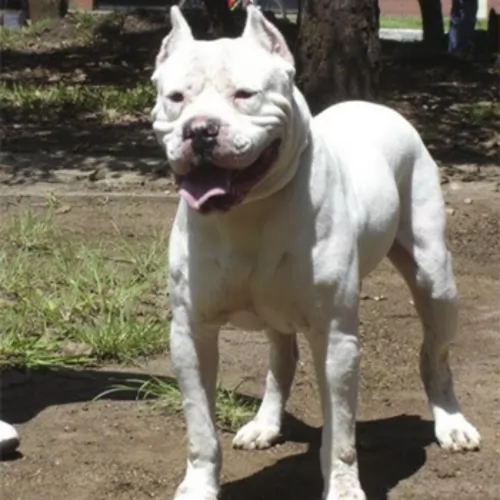 Your Dogo Guatemalteco is an intelligent dog breed, and because he is strong-willed and stubborn he might give you a hard time during training. It is possible though and it is important as the training will turn him into an obedient, relaxed dog, able to get on with all his family members, including pets.
Your Dogo Guatemalteco is an intelligent dog breed, and because he is strong-willed and stubborn he might give you a hard time during training. It is possible though and it is important as the training will turn him into an obedient, relaxed dog, able to get on with all his family members, including pets.
He is an energetic dog and will require walks and other forms of exercise each day.
This is certainly not the kind of dog that you buy to protect your property and provide little else for him except food and water. Frustration on the dog’s part can lead to destructive behavior and aggression.
 Miniature Fox Terriers aren’t going to disappoint you one bit in terms of making an excellent pet.They make great family pets. They are loyal companions and they also make great watchdogs, being able to adapt to life in the city as well as the countryside.
Miniature Fox Terriers aren’t going to disappoint you one bit in terms of making an excellent pet.They make great family pets. They are loyal companions and they also make great watchdogs, being able to adapt to life in the city as well as the countryside.
They can yap quite loudly so you need to be careful of this if you live in a small property in the city.
This is such a jaunty little dog, full of fun and high spirits. You won’t know a dull moment with such a friendly, entertaining little pet. In exchange for all he offers you in terms of friendship, he also wants your love and attention.
Provide him with good food, a good deal of exercise, a dry, warm place to sleep and your ongoing attention and he is going to shower you with his love and loyalty.
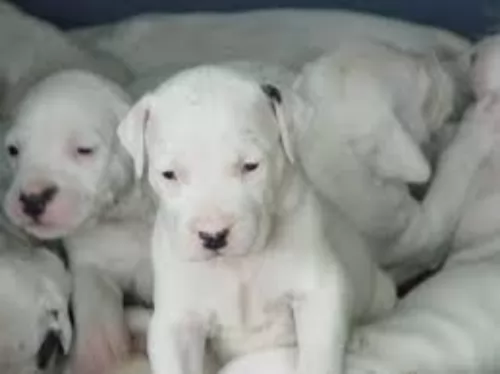 This dog can be susceptible to skin allergies. The skin is sensitive and prone to rashes.
This dog can be susceptible to skin allergies. The skin is sensitive and prone to rashes.
Another health concern with this dog because of his white coat, is congenital deafness. The deafness could be in one- or both ears.
The dog could also experience lameness, of which the most common problem is hip dysplasia. Because skeletal problems occur in this breed, it is advisable for owners to have their pet tested by the Orthopedic Foundation for Animals.
 Your Miniature Fox Terrier can live to be between 10 and 14 years of age when looked after well, but there are one or two common dog illness that can plague any dog, and Paella Luxation is one.
Your Miniature Fox Terrier can live to be between 10 and 14 years of age when looked after well, but there are one or two common dog illness that can plague any dog, and Paella Luxation is one.
Patella luxation is fairly common with small dogs, occuring when the dog’s kneecap becomes dislocated from its thigh bone.Your dog will skip and hop along. Treatment for patella luxation can range from non-invasive treatments such as massage to surgery.
Dental health is important too, and seriously bad breath can be indicative of dental decay. Dental plaque can cause bad breath and lead to other health problems that aren’t directly related to teeth. The heart and kidneys can be put at risk. There are dental products such as canine toothbrush and toothpaste which can be used to clean your dog’s teeth. Don’t ever use human toothpaste as this can be toxic for your pet.
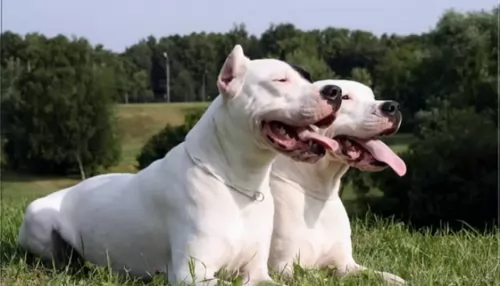 The coat of the dog is short and harsh and it sheds throughout the year. While he is still looked upon as a low maintenance dog, regular brushing will be required twice a week.
The coat of the dog is short and harsh and it sheds throughout the year. While he is still looked upon as a low maintenance dog, regular brushing will be required twice a week.
Because he is a dog breed that is susceptible to skin allergies, bathing isn't necessary as it removes the dog’s natural oils.
Other areas of grooming for this dog are brushing his teeth twice a week, trimming his nails and checking his ears.
Always choose a high quality dog food for your Dogo Guatemalteco and look at the feeding recommendations on the packaging.
When you feed your pet kibble, you can also mix in some cooked brown rice, vegetable and chicken for variety and contentment.
Raw meat is also advised from time to time. Don’t just go on and on through the years feeding your dog the same amount of food, as there are factors to take into account when deciding on food quantity. The age of your dog, it’s stage of life and its activity levels will mean regulating your pet’s food to match his needs.
 Feed your terrier a quality commercially manufactured dog food twice a day. They are small dogs, but highly energetic so choose dog foods which are geared towards small, energetic dogs.
Feed your terrier a quality commercially manufactured dog food twice a day. They are small dogs, but highly energetic so choose dog foods which are geared towards small, energetic dogs.
His age and his activity levels will also give you an idea as to what to feed him. Apart from dry kibble, give him simple, tasty, nutritious home-made food too.Every now and again, add in boiled chicken, brown rice or pasta and some cooked vegetables such as potato, carrots and spinach. A little bit of raw meat occasionally can also do wonders.
Keep meals plain and simple like this to avoid stomach upsets.
Ensure your pet has constant access to fresh, cool water.
Brush him twice a week to keep the coat free of loose hair. Try and avoid bathing your pet as it causes dry skin and itchiness. Rather wipe him down with a rubber grooming mitt to keep him groomed.
Check his eyes and ears for infection. Check for fleas and ticks and any unusual lumps. Trim his nails too.
Take him to the vet when he appears to be ill and keep his vaccines up to date.